EU Enlargement Entering Geopolitical Mode
Adelina Marini, January 7, 2016
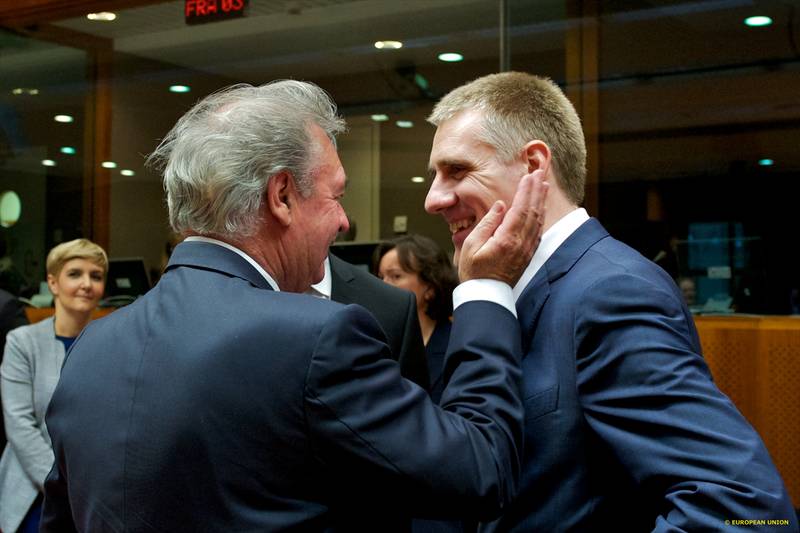 The year 2015 opened new pages in one of the oldest EU community policies – enlargement. This process was thrown in the cellar during the euro area crisis, the war in the Ukraine, and all the problems springing up in the Middle East and North Africa right when it was the turn of the most problematic states – Turkey and the remainder of ex-Yugoslavia, some of which were created with the help of the international community. When announcing his priorities after being elected President of the European Commission back in 2014, Jean-Claude Juncker (Luxembourg, EPP) spoke of pushing the pause button on enlargement. This was interpreted as freezing, further strengthened by the change of the name of the portfolio in the European Commission – Commissioner for European Neighbourhood Policy and Enlargement Negotiations.
The year 2015 opened new pages in one of the oldest EU community policies – enlargement. This process was thrown in the cellar during the euro area crisis, the war in the Ukraine, and all the problems springing up in the Middle East and North Africa right when it was the turn of the most problematic states – Turkey and the remainder of ex-Yugoslavia, some of which were created with the help of the international community. When announcing his priorities after being elected President of the European Commission back in 2014, Jean-Claude Juncker (Luxembourg, EPP) spoke of pushing the pause button on enlargement. This was interpreted as freezing, further strengthened by the change of the name of the portfolio in the European Commission – Commissioner for European Neighbourhood Policy and Enlargement Negotiations.
The refugee and migrant crisis, “the return of geopolitics” (in the words of European Council President Donald Tusk), and the cloning of conflicts in the Middle East made the EU realise that it had forgotten several states, strategically important to its security, in the cellar. So after an intensive year of emergency meetings and risk increases at the end of the year the EU officially pulled enlargement out of the freezer. Turkey opened the first negotiations chapter in two years, Serbia finally got the long-awaited opening of its first two chapters since it received negotiating country status, the Stabilisation and Association Agreement with Bosnia and Herzegovina was unfroze, Montenegro received an invitation to join NATO, Kosovo is linked to Serbia’s progress. Only Macedonia is left in the freezer for now. At first glance those are good news. In their essence, however, those are crisis actions, which will not solve the problems, but will only sweep them under the rug in the well established EU tradition.
Re-energising the European integration of Turkey
The first intergovernmental conference on Turkey’s accession in a long time was held on December 14th, during which the opening of Chapter 17 of the negotiations, which covers economic and monetary policy, was officially approved. With it the total number of negotiation chapters opened with Turkey becomes 15 out of a total 35. A huge Turkish delegation appeared for the joint press-conference, which was frustratingly short (just two questions were allowed). On the tribune stood Deputy Prime Minister Mehmet Şimşek, Foreign Minister Mevlüt Çavuşoğlu and Minister of EU Affairs Volkan Bozkır. The hall was also filled by dozens of other members of the delegation. There were many journalists from Turkey present as well. There was interest from the Brussels-based correspondents.
This press-conference was an accurate illustration of everything that is wrong in the relationship between the EU and Turkey. From the European side the well-known scene of good cop – bad cop was played, with the good cop role being played by Luxembourg Foreign Minister Jean Asselborn, who was finishing the six-month successful Luxembourg presidency in the Council with this meeting. He was sincere in saying that the EU needed Turkey as a strategic partner in many international spheres like migration, fight against terrorism, energy, trade, the climate. The minister admitted that the habit of having such meetings was lost. “Turkey is really an extremely important partner for the stability and security of our continent. It's too important a partner not to meet with it regularly at the highest level”, added Jean Asselborn, who had the same function ten years ago when Turkey officially started its membership negotiations.
The bad cop role was played by Commissioner for Enlargement Negotiations Johannes Hahn (Austria, EPP), who first of all commended Turkey for its economic achievements, stating that some European economies could only dream of the Turkish achievements in lowering public debt to a little over 30% of GDP from 70%. This brought pleased faces in the Turkish delegation, but was immediately followed by the cold shower of reality. Turkey’s progress towards European membership will depend on the pace at which the problems with political criteria, like rule of law and especially fundamental rights, are dealt with. Mr Hahn underlined that in order to fulfil the new dynamics in EU-Turkey relations, stated on November 29th, Ankara needed to urgently address all weaknesses marked out in the progress report of November 2015.
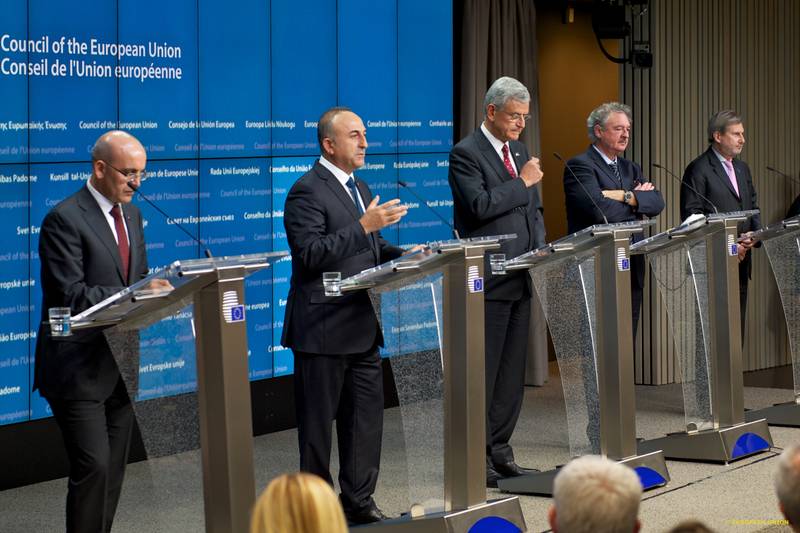
First from the Turkish delegation spoke Minister Volkan Bozkır to whom the opening of Chapter 17 was not enough. The re-energising of Turkish-European relations will be a fact when chapters 15 (Energy), 23 (Judiciary and Fundamental Rights), 24 (Justice, Freedom, and Security), 26 (Education and Culture), and 31 (Foreign, Security and Defence Policy) are opened. “Turkey expects to join the Union as an equal member with all the rights and obligations which would imply upon the successful conclusion of negotiations”, stressed Mr Bozkır. Mehmet Şimşek, the deputy prime minister, added that Turkey would do whatever is necessary to become a full member of the EU, which includes unfreezing by the Turkish side of several unsolved issues between the two sides – the additional protocol for including Cyprus in the Customs Union, the resolution of the Cyprus issue, the implementation of the readmission agreement, and as of end November controlling the refugee flow to Europe, the fight against terrorism and cooperation on solving a number of conflicts in the Middle East.
It became clear from the statements of leaders several days later during the EU summit of December 17-18 that member states are not ready at all to respond with reciprocity to the Turkish strive for full membership. German Chancellor Angela Merkel said during a midnight press-conference in Brussels that she was forced to work for Turkey’s membership by her predecessor Gerhard Schröder, who made the decision Turkey to receive candidate country status on his own. “I wouldn't have decided that at the time. But I feel bound to build on what was decided by my predecessor”. She said that in the context of the British demands that member states commit to making changes in the foundation treaties at a later time, which will answer British concerns, by stating that such important decisions demand coalition negotiations, debates in parliament, and that it is wrong for today’s leaders to make commitments instead of future governments.
In 2004 Gerhard Schröder promised Germany’s support for Turkey’s membership, regardless of growing opposition within the country. One of the most avid critics of his decision at the time was namely Angela Merkel who, as a leader of the Christian Democratic Union, made it clear that she would do all in her power to stop Turkey’s candidacy in the EU if she was elected. French President François Hollande expressed France’s usual restraint on the issue. At the European Parliament, several days earlier, during the discussion on the programme for the December summit, British eurosceptics posed the question about Turkey’s EU membership directly to the leader of the group of European Conservatives and Reformists, where the British Conservatives of David Cameron are represented. Syed Kamall replied: “We need to be honest with Turkey. Turkey will never be part of the EU. I’m sorry. And there are a few reasons. Some of it based on prejudice about their faith, some because they believe Turkey is not in Europe, some because they want a common foreign and security policy, others worry about the number of MEPs”.
Those are just single examples of the rather negative attitude within the EU towards a possible future Turkish membership in the Union, but the problem is that for a full decade, since Turkey has been granted an official candidate country status, the Union has been postponing answering the question whether its membership is acceptable at all to European citizens. At the moment the dire need for control over the refugee flows is forcing European leaders to continue playing the game of enlargement, hoping the problems that Turkey has will give enough time to member states to come up with a way out of the mess they themselves created ten years ago. And the problems are many and extremely serious. One of them is repressions against journalists and media. During the press-conference in Brussels last month a journalist from the Turkish newspaper Zaman asked both sides what would be the solution to the problem with the journalists arrested in November – the editor-in-chief of the Cumhuriyet newspaper Can Dündar and the head of the newspaper’s Ankara office Erdem Gül.
They were arrested and charged with espionage and conspiracy for their article revealing that Turkish trucks were smuggling guns into Syria. The question of the colleague from Zaman wiped out the smug smiles from the faces of the three high-ranking Turkish officials and placed sternness there. Deputy PM Şimşek replied coolly that the issue with the arrested journalists was being handled by the judiciary. “Turkey has rule of law and it wouldn’t be appropriate for me to comment on the judiciary process. However, I would like to note that no country would allow rogue state and much of what has happened over the past few years should be considered within that context”, he said. Luxembourg Foreign Minister Jean Asselborn replied with the customary European cliché, which has been losing 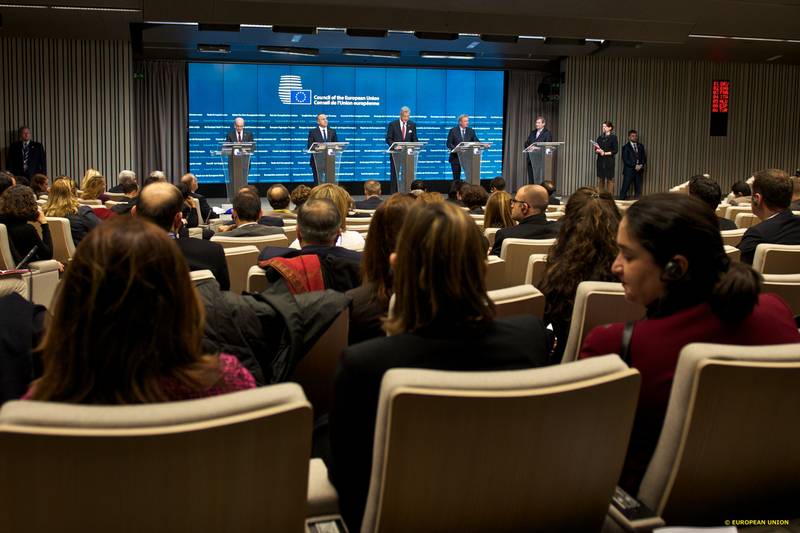 substance more and more, that rule of law, fundamental rights, and freedom of the press are fundamental values to the EU.
substance more and more, that rule of law, fundamental rights, and freedom of the press are fundamental values to the EU.
On January 5th a third court instance denied the release of the two journalists, who “Reporters without borders” organised a petition for and wrote an open letter to President Recep Tayyip Erdoğan. Can Dündar voiced sharp criticism of the EU from prison for selling out its values for 3 billion euro. In an article from December 21st for The Washington Post he reminded of the Turkish custom of showing good image to the guests and later, in private, pulling out the brutal face of violence. Mehmet Şimşek’s referral to rule of law is in direct contradiction with the EU General Affairs Council's, which a day after the opening of a new chapter of the negotiations approved the Commission progress reports. In the conclusions of the Council there are serious concerns and there is an appeal to Turkey, which “urgently needs to remedy and further address major shortcomings identified in the Commission's report, notably in the areas of rule of law and fundamental rights".
The word “urgently” is also used regarding the independence of the judiciary and the media. In the conclusions there is special concern about the legal proceedings against critical media, journalists, writers, and also social media and their users.
The sphere of rule of law is just a part of the problems that the EU has with Turkey. There is criticism in the Commission’s report and the General Affairs Council's conclusions regarding Cyprus. Those are problems, which instead of being solved become deeper and deeper after Turkey chose the path of authoritarianism. The EU is probably hoping that after the refugee crisis passes it will be able to put Turkey in the freezer again with the argument that it is not complying with the set conditions. If Ankara, however, fulfils all the promises it made in the last close to two months it would put the EU in a very precarious situation. Rebuffing Turkey in such a serious geopolitical time could prove a much more serious danger to European security than accepting the state in the Union. Salvation could be sought in a potential split of the Union into clubs with different orbits and speeds of integration.
Europe ceased being a dream for Serbia
Serbia is also a large geopolitical challenge, although the EU is not as generously inclined as with Turkey. The fact that the first two chapters were opened shows that the EU understands that Serbia’s patience is running out and it will not be a second Macedonia – having a negotiating country status, but not beginning negotiations because of unresolved problems for years on end. The nature of the two chapters clearly indicates that Serbia carries a large geopolitical charge – a multitude of unsolved problems since the war, which have become aggravated in the last weeks, and the role of Russia. All the way at the third spot come the usual problems to EU enlargement with former totalitarian regimes, like the rule of law, freedom of the press, and fundamental rights.
December 14th was a historic day for Serbia. Although the Serbian delegation was much smaller than the Turkish and the media interest negligible, Prime Minister Aleksandar Vučić was preparing for this day very carefully. He published op-eds in Serbian media, gave prolonged interviews, placed the subject at the centre of Serbian attention. Alas, the long-awaited moment of the official announcement of the opening of the first chapters came to a false start, which gave the feeling that Serbia is just one more on the European conveyor. The intergovernmental conference started right after the Turkish one. It turned out, however, that Luxembourg Foreign Minister Jean Asselborn had misplaced the sheets of paper with the introductory words and pulled out by mistake the Turkish ones and began reading from those. The opening words truly were identical. Serbia was also commended 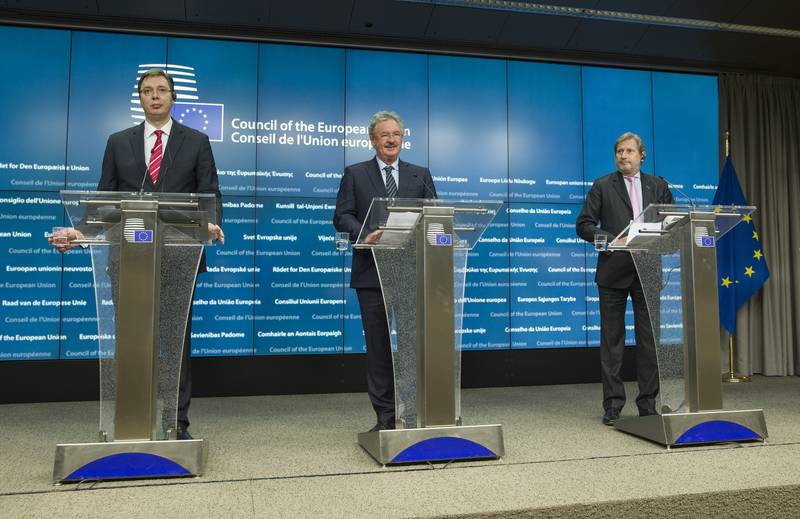 for the started reforms and the successes in the economic sphere, but Belgrade received a cold shower from Commissioner Hahn.
for the started reforms and the successes in the economic sphere, but Belgrade received a cold shower from Commissioner Hahn.
He made it very clear that Serbia will not be accepted in the EU while it continues to be a source of migrants to the wealthier EU countries. “Of course, we like brain circulation, but we don't like brain drain and this is another element which is so decisive if you want to be a member of the EU”, said the Austrian commissioner. The speeches of Jean Asselborn and Johannes Hahn were in full contrast with the speech of Serbian Prime Minister Aleksandar Vučić, who stated that he was extremely proud of his country and named December 14th a revolutionary day. He answered the commissioner in stating that Serbia was joining not just because of the economic stimuli, which he placed in second and third place. At the core is the type of society that Serbia is striving for.
The EU changed its usual approach to the negotiations and instead of chapters 23 and 24, which concern one of the most serious problems of the enlargement countries – rule of law and fundamental rights - decided to open chapters 35 and 32. The first one deals with the relationship with Kosovo and the fact that it is the first to be opened clearly shows that Brussels had learned its lessons from yet unresolved bilateral problems from the disintegration of Yugoslavia. This chapter will be negotiated in the same manner as 23 and 24 – it is opened first and closed last. Chapter 32 (Financial Control) looks like it is going to serve as a sweetener for the fact that Serbia, in practise, is not starting real membership negotiations. The EC adamantly denies any link between working on Chapter 35 and the opening of 23 and 24, but there is no set date for their opening yet. Serbian PM hopes it will happen in the spring, the EC thinks there is a possibility that they are opened in the first half of 2016.
None of the European representatives present could give a clear enough answer to the question whether the time has come Serbia will have to recognise Kosovo in order to join the EU. Serbia was not recognised by the European leaders for an equally extremely important strategic partner to Europe like Turkey was. Johannes Hahn’s team does not believe that as intense a dialogue is needed with Serbia as with Turkey – meetings at the highest possible levels several times a year, structured dialogue on different subjects of common interest, like migration, the economy, fighting terrorism at the ministerial level, etc. The Commission and the External Service think that contacts with countries of the Western Balkans and especially Serbia are very strong. It is true that there is marked change over the last year, but considering the challenges the EU should probably think about intensifying contacts, mostly because of bilateral relations. They must be included as a major priority in the negotiations with Serbia, for there are already enough red lights lit, warning the EU that it should not let the region out of its sight like it did in the previous 20 years.
One of these lights is PM Vučić congratulating at the press-conference not only Serbia, but also “our people” in Republika Srpska in Bosnia and Herzegovina. Over the last few weeks the statements exchange between Belgrade and countries of the region, like Montenegro and Bosnia and Herzegovina, intensified. The outburst of the Serbian PM against a Kosovo journalist illustrates the sensitivity of the region. The latter started asking a question about an upcoming meeting between Vučić and Milorad Dodik, whom he named “the mad man of BiH”. This clearly outraged Aleksandar Vučić, who stated that he would not allow such language to be used about the president of Republika Srpska. The journalist further outraged the Serbian PM with his interpretation of the PM’s opening remarks that “today is a great day for Serbia”. According to the journalist, the Serbian Prime Minister talked of a Greater Serbia.
The incident cannot be written off just as bad journalism, for it shows openly how aggravated are attitudes in the most difficult countries of the Western Balkans, where trust is still too low. Serbia has been highly agitated lately also by the not too-advertised and currently frozen deal of the Croatian defence ministry for the procurement of new weaponry. The deal is stopped because of the running out of the term of the Croatian government, but the subject is in Serbian media almost daily, which is characterised in Zagreb as “going in hysterics”. At the end of the year PM Vučić threatened Croatia that if it were to go through with the deal, Serbia would have to somehow answer the threat. There was even talk back then on both sides about an arms race with the participation of Russia, of course. 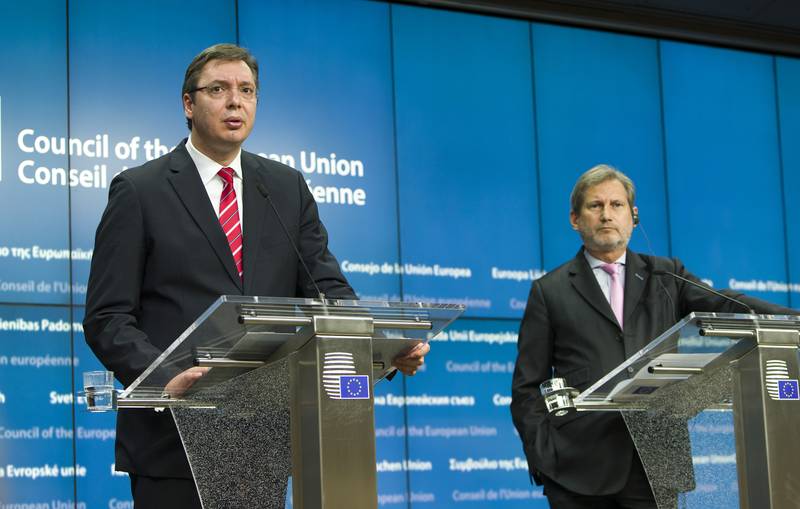 Deputy Prime Minister and Foreign Minister Ivica Dačić in turn stated on January 4th that considering the range of the provisioned procurement of ballistic missiles – 300 kilometres - their only target must be Serbia.
Deputy Prime Minister and Foreign Minister Ivica Dačić in turn stated on January 4th that considering the range of the provisioned procurement of ballistic missiles – 300 kilometres - their only target must be Serbia.
Verbal shootouts exploded between Belgrade and Podgorica as well after Montenegro received an official invitation to join NATO, which Russia is sternly against. There was tension between Serbian President Tomislav Nikolić and the Serbian member of BiH’s presidency as well. For all these conflicts, however, there is now a clear horizon on when Serbia is going to give up on Russia. This will happen by the year 2018 if we are to trust the words of Aleksandar Vučić. Answering a journalist’s question he stated that “in the times to come we're going to have to see how we're going to align with EU, because maybe not in 2016, maybe not in 2917 we'll have to do it”.
And by then?
The EU keeps making the same mistake all the time – blocked by its inefficiency and lack of unity the Union stays mainly focused on itself and the putting out of the constantly emerging fires in its vicinity. It is counting on the enlargement policy continuing to be a major transformation force, but it is obvious that it is fading away by the day and gives way to geopolitical forces. Instead of working out a comprehensive strategy for the most difficult countries that are left in the enlargement process the EU once again sweeps the problems under the rug, counting on a more convenient historical moment, or on a solution that will present itself to someone somewhere in time. This only exacerbates the problems and presents a risk to European security. Former Director General of the Enlargement Directorate of the EC Sir Michael Leigh also warns of this, publishing a text about the lessons from the accession of Bulgaria and Romania right on December 14th when the two intergovernmental conferences with Turkey and Serbia took place.
In the article he warns: “Outsiders, whether in the EU or NATO, can have only a limited impact in the Western Balkans or in former Soviet states, unless politicians and officials in these countries make a decisive break with crony capitalism and corruption. Faced with multiple crises, and astute Russian pressure, EU leaders are rushing somewhat precipitately to embrace realpolitik. But if they wish to complete the integration of Bulgaria and Romania, and encourage reform in countries to the east, they must take care, in their embrace of geopolitics, not to compromise the principles on which the EU is said to be founded”.
And while the EU stood and watched from the side the mass protests in Montenegro in the end of 2015, which the government of the small Balkan state claimed were organised by Russia to deter the country’s NATO membership, the Organised Crime and Corruption Reporting Project (OCCRP) gave its annual award for corruption to Montenegro PM Milo Đukanović “for his work in creating an oppressive political atmosphere and an economy choked by corruption and money laundering”. He received the title “Person of the Year for his work in promoting crime, corruption and uncivil society”. On December 21st the EU opened two more negotiation chapters with Montenegro – number 14 (Transport Policy) and number 15 (Energy). The government hopes Montenegro will join in 2021.
Geopolitics and compromises with values are equally devastating forces to the EU. In 2016 the Union must find a way to synchronise these forces so they are not mutually exclusive. This is going to be the greatest challenge to enlargement and the EU itself.
Translated by Stanimir Stoev
 Bakir Izetbegovic, Andrej Plenkovic | © Council of the EU
Bakir Izetbegovic, Andrej Plenkovic | © Council of the EU Aleksandar Vucic, Recep Tayyip Erdogan | © Serbian Presidency
Aleksandar Vucic, Recep Tayyip Erdogan | © Serbian Presidency Jean-Claude Juncker, Zoran Zaev | © European Commission
Jean-Claude Juncker, Zoran Zaev | © European Commission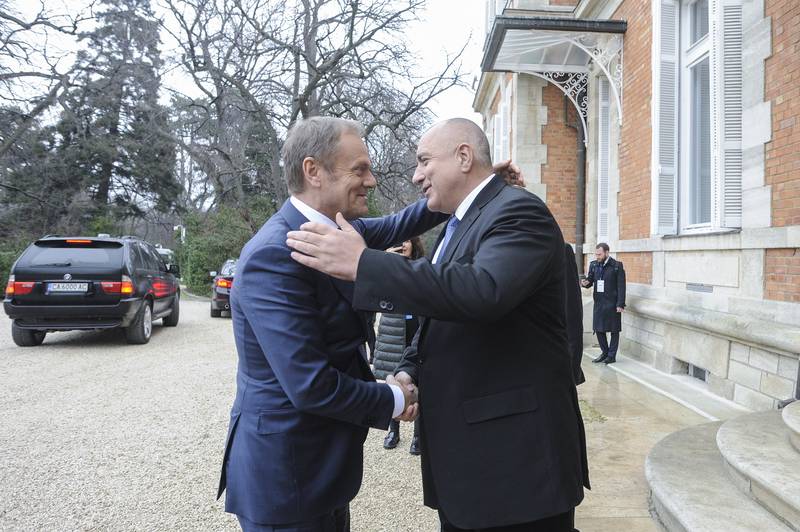 Donald Tusk, Boyko Borissov | © Council of the EU
Donald Tusk, Boyko Borissov | © Council of the EU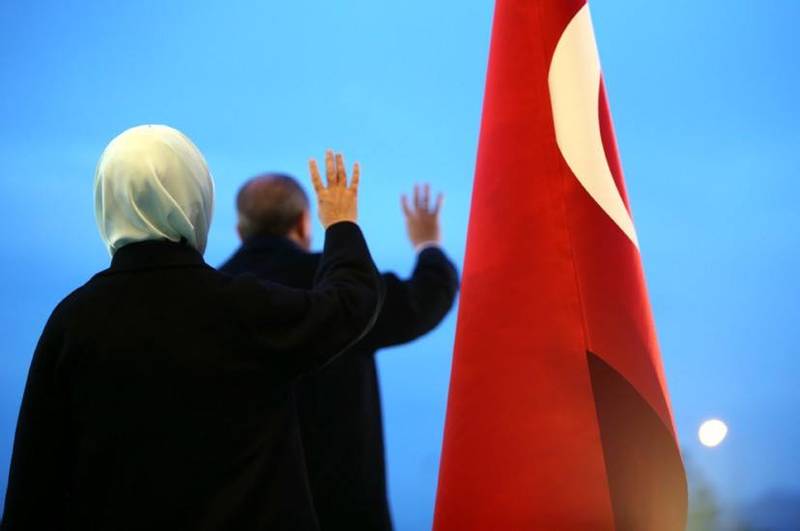 | © Turkey Presidency
| © Turkey Presidency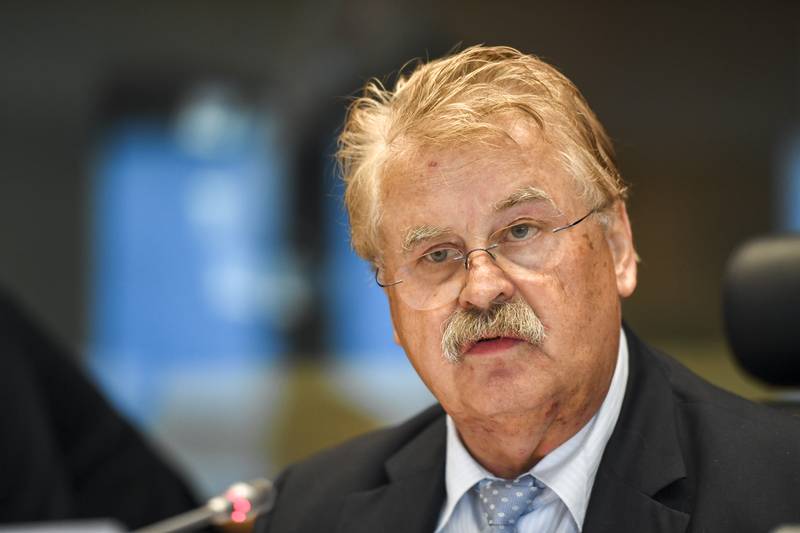 Elmar Brok | © European Parliament
Elmar Brok | © European Parliament